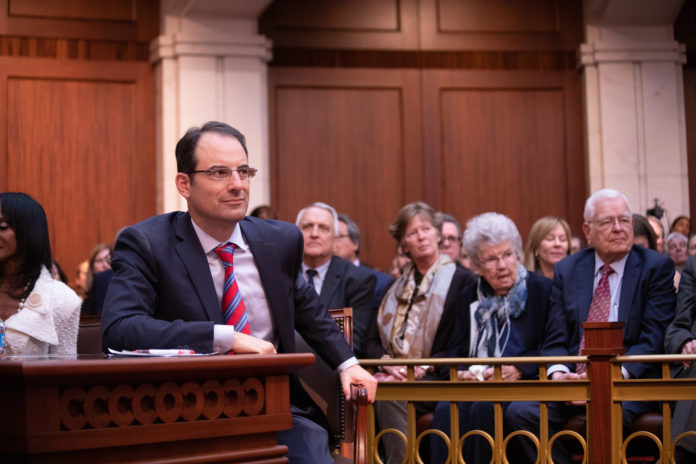
Colorado Attorney General Phil Weiser used an uncommon method to reach a resolution in a would-be antitrust case before filing a complaint.
The attorney general announced last week that he reached a consent judgment to enforce antitrust laws and add checks to a proposed merger between UnitedHealth Group and Colorado-based DaVita Inc. Weiser said the mechanism allows him to ensure Colorado consumers — particularly those in Colorado Springs — have choices in their health care and hold the companies accountable. His announcement came a day before the Federal Trade Commission announced a separate consent order in a settlement that clears the way for the companies’ merger.
The FTC settlement requires UnitedHealth to divest DaVita Medical Group’s healthcare provider organization in the Las Vegas Area to a Utah-based healthcare provider and insurer. With the FTC’s settlement, UnitedHealth Group announced it closed its $4.3 billion acquisition of DaVita Medical Group, originally announced in 2017.
Colorado’s agreement similarly sets requirements to mitigate anticompetitive effects in the state.
The Colorado Attorney General’s Office on Tuesday filed the consent judgment alongside a complaint in El Paso County Court that challenged UnitedHealth’s acquisition of the physician practice of DaVita Inc. The consent judgment, agreed to by the merging parties, addresses the state’s concerns about the merger cited in the complaint.
According to the Attorney General’s Office, the merger would harm the market for Medicare Advantage plans in Colorado Springs, where DaVita Medical Group, a wholly-owned subsidiary of DaVita, owns two large physicians’ groups. UnitedHealthcare is the largest provider of Medicare Advantage plans in the region and is the sister company of Optum, a medical group of physicians, ambulatory surgery centers and urgent care centers.
In December 2017, UnitedHealth Group announced its subsidiary, Optum, would acquire DaVita Medical Group. The U.S. Federal Trade Commission investigated the merger but declined to seek any remedies to protect Colorado consumers.
“The combination of Optum and DaVita Medical Group would create significant market power with the ability and incentive to raise DaVita Medical Group’s price to other insurance companies that serve Medicare Advantage patients in the Colorado Springs Area,” said a statement from the Attorney General’s Office. “If left unchecked, the merger would result in reduced competition, higher health care costs, reduced benefits and fewer choices for seniors.
Weiser said the use of a consent judgment is an uncommon move, and he said this marks the first time the mechanism has been used in Colorado. Through the consent judgment, the Attorney General’s Office and the parties form an agreement without trial or adjudication of any issue of fact or law. Colorado requires the defendants to follow the measures described in the consent judgment to remedy the loss of competition alleged in the complaint.
Under the terms of the consent judgment, UnitedHealthcare will lift its exclusive contract with Centura Health for at least three-and-a-half years, which, the Attorney General’s Office said will expand the network of health care providers available to seniors in Medicare Advantage plans offered by other providers. DaVita Medical Group’s agreement with Humana — UnitedHealthcare’s main competitor in Colorado Springs — will be extended without change through at least the end of 2020.
“The usual way this happens is the states are in the backseat without the ability to drive or dictate what happens,” Weiser said. “I wasn’t going to sit in the backseat and just follow what the FTC did. I said we have the legal authority and the responsibility to drive in the direction that protects Colorado consumers.”
Should the parties not meet the terms of the consent judgment, the state could enforce it by going to court to hold the parties to the legal requirements of the consent decree and potentially hold the parties in contempt of court if they fail to comply.
“We believe the requirements are very plain and easy to understand, and we expect them to be followed to the letter,” Weiser said.
The announcement from the Attorney General’s Office follows on an announcement from earlier in June that Colorado was joining several states in a lawsuit to block the merger of T-Mobile and Sprint.
Earlier in his career, Weiser worked in the antitrust division of the U.S. Department of Justice. Weiser said antitrust is a primary focus for his office in its role in consumer protection. He said his commitment to consumers is core to his agenda as attorney general.
“We need to be willing to take action as appropriate … We’re not going to wait for the federal government, we will stand up,” Weiser said. “Important to the system of federalism is the checks. We’re not stuck with the federal government doing everything it wants. States have the authority to do that, and we will do that.”
— Tony Flesor, [email protected]

